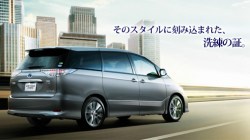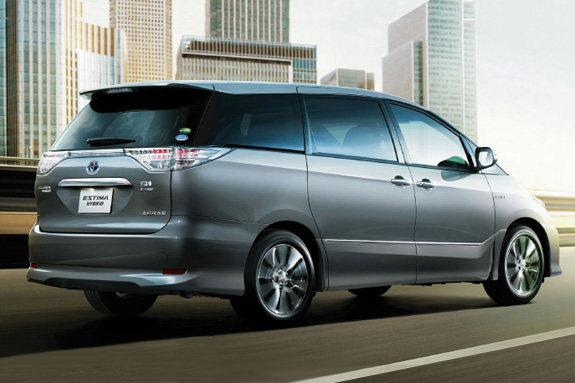
ToyotaThe Toyota Estima Hybrid. The Japanese text translates to “Ha ha, you can’t have one.”
For years, Grist readers have yearned, ached, and virtually begged for a hybrid minivan. Sorry, folks. Keep dreaming.
Toyota has sold its Estima Hybrid minivan (44 mpg) in Japan since 2001, but it has no plans to sell a hybrid or plug-in minivan in the U.S., a spokesperson tells the Chicago Tribune.
Why not? Green-car expert Jim Motovalli explains:
I have brought up the concept of a plug-in hybrid minivan several times to automakers, and they always dismiss it. Their claim: Minivans are big and boxy, and the fuel economy wouldn’t improve that much with a hybrid drivetrain. Plus, they’d be expensive (the Estima is $50,000). Besides, that segment of the market is really not that big, they say.
Tribune writer Robert Duffer speculates that Americans are just too demanding:
We want fuel economy but we want power and the ability to carry a lot of weight. All of these factors would reduce the effectiveness of a hybrid or plug-in on fuel economy. Other speculation on car forums clamoring for the hybrid minivan is that it wouldn’t meet stringent U.S. safety requirements. It would end up weighing about the same as the Toyota Sienna, again reducing the effectiveness of its hybrid gains.
On top of that, “Minivan owners are among the most cost-conscious shoppers, prizing utility and value.” Demanding and cheap.
Plus minivans are totally out now:
According to CNBC in March, minivans are on the decline, making up just three percent of total auto sales. Only 500,000 were sold in 2012. In 2000, there were 1.37 million sold.
Ford and Chevy don’t even make a minivan anymore. … It’s all about the crossover, or CUV, these days. It’s neither minivan nor wagon nor sport utility vehicle, shaking off the stigmas of each into its own hip sub-class. CUVs are more fuel efficient than SUVs, sharper looking than minivans and more versatile in terms of passengers than a wagon.
Car shoppers who want both roominess and efficiency could consider the crossover Ford C-Max Hybrid — “a mini minivan,” as Duffer puts it. Except that Ford just had to lower the car’s fuel-economy numbers this week and send “goodwill” checks to disgruntled customers. D’oh.




